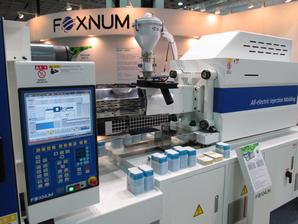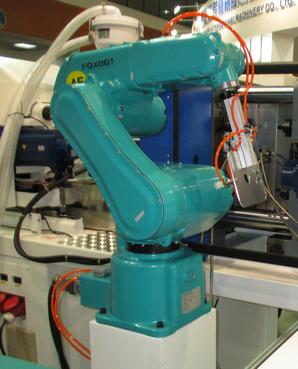By Steve Toloken
STAFF REPORTER / ASIA BUREAU CHIEF
Published: September 26, 2014 2:48 pm ET
Updated: September 26, 2014 3:03 pm ET

Image By: Steve Toloken
Foxconn Technology's new subsidiary, Foxnum Technology Co. Ltd. has begun selling electric injection molding machines.
TAIPEI, TAIWAN — For years, Taiwan’s Foxconn Technology Group has been the world’s largest contract manufacturer for electronics, with more than 1 million employees worldwide churning out smartphones, tablets and gadgets for nearly every company in the global computer industry.
Now it wants to sell you an injection molding machine.
The Taipei-based manufacturer used the opening day of the Taipei Plas show Sept. 26 to publicly launch its new business selling all-electric injection machines.
True to its reputation as a tight-lipped organization, executives were cautious when speaking about future plans.
In an interview in their booth, they said they’re starting small, with a factory in the industrial city of Taichung in central Taiwan.
But given Foxconn’s manufacturing expertise and huge resources — with 2013 sales of $131.8 billion — it’s bound to be a closely watched entrant into a crowded field.
At the show, its Foxnum Technology Co. Ltd. subsidiary presented its FAE series all-electric machines ranging from 50 tons to 450 tons clamping force, with injection speeds of up to 350 millimeters per second, targeting precision manufacturing markets including medical, packaging and electronics.
The company has been manufacturing the machines for internal Foxconn Group use since 2009, but this was its first trade show. Executives said they believe Foxconn’s knowledge gained from working with demanding customers like Apple and Dell will give Foxnum a leg up in understanding what the broader market needs.
As well, they said they plan to focus on offering complete manufacturing lines, including “Foxbot” robots, also made by Foxnum, on display in the booth.
“Because our technology is made by ourselves, all the injection molding technology is made by ourselves, including the software, we can integrate all the peripheral equipment and match the customers’ needs,” one company executive said. “And we can adapt immediately.”
Another aspect of Foxconn’s corporate culture — its secrecy — was also on display, in what made for a somewhat unusual trade show interview.
The three managers interviewed in the booth all spoke on condition they not be named, even to discuss molding machines. Foxconn’s strict policy only allows for Chairman Terry Gou to speak to media, they said.
Foxnum’s molding machinery business is a miniscule part of Foxconn’s overall business. They say they’ve sold between 100 and 200 all-electric machines internally to Foxconn since 2009.

Image By: Steve Toloken
Foxnum is also making robots under the name Foxbot.
And they said their target for injection molding machinery sales next year is only $6 million, a tiny amount that would not attract attention, except for the connection to their well-known parent conglomerate.
“We just test the market,” one Foxnum executive said. “I cannot give you the business target [long term] but I can fill it. I need many exhibitions… I need many, many agents, it’s a global business,” he said, before adding. “We think we can get it.”
The Foxnum subsidiary currently employs about 150 people in Taichung, with only about 20 making molding machines.
But they hoped to make a strong public statement at Taipei Plas.
They took a large booth at the very front of the main hall, and said they’re considering what other shows to exhibit at, possibly including next year’s NPE show in Orlando, Fla.
Foxnum executives believe that access to Foxconn’s diverse manufacturing platform will give it a cost advantage against other plastic equipment makers.
For example, they pointed to Foxconn’s announcement in early September that it would invest $800 million to make electric cars in China’s Sichuan Province. Those electric cars need many of the same components as the injection machines, they said.
“Servo motors, servo drivers and controllers, all those technologies came from Foxconn,” one executive said. “Those technologies can all apply to an electric car. Injection molding is just another application.”
Getting access to cheap servo technology has been a problem for other Taiwanese machinery makers who have tried to make all-electrics. Those companies have been forced to buy expensive German and Japanese components, negating any cost advantage Taiwanese firms might have.
Foxnum said it believes it’s the only Taiwanese company able to supply its own controllers, servo drives and servo motors, although it said it still needed some parts like IGDB drives from German and Japanese suppliers.
Globally, Foxnum executives said Foxconn has about 10,000 injection molding machines in its factories.
Foxnum said it’s also made about 500 hydraulic machines for Foxconn, buying hydraulic presses from another machinery maker and adding Foxnum controllers.
One executive said it has no plans to sell hydraulics because “all-electrics are the future trend.”
Foxnum officials said they started making the all-electrics in 2009 because Foxconn worried about not being able to respond fast enough to customers when new orders came in.
“Usually those end customers like Nokia, Apple, whatever, they would need a very quick delivery time,” a Foxnum manager said. “If your delivery time is controlled by other injection molding machine suppliers, and you have to wait 2 to 3 months, it’s impossible for you to supply all your components to Apple or Nokia, so you would lose the order.
“The reason we made our own injection molding machine is we want to seize the time and offer the best delivery time for our customers,” the manager said.
| 